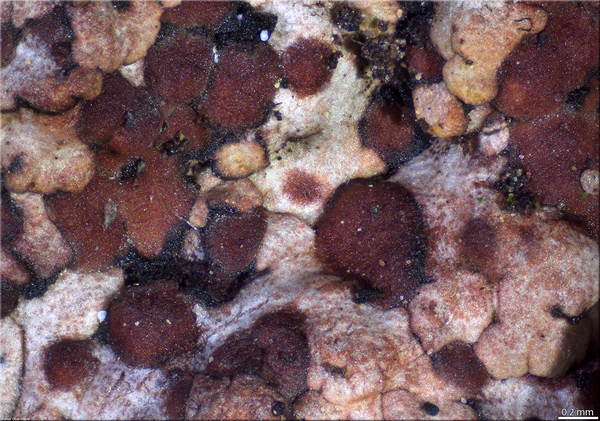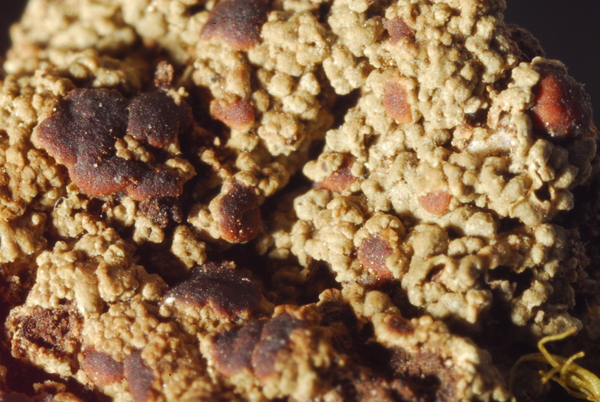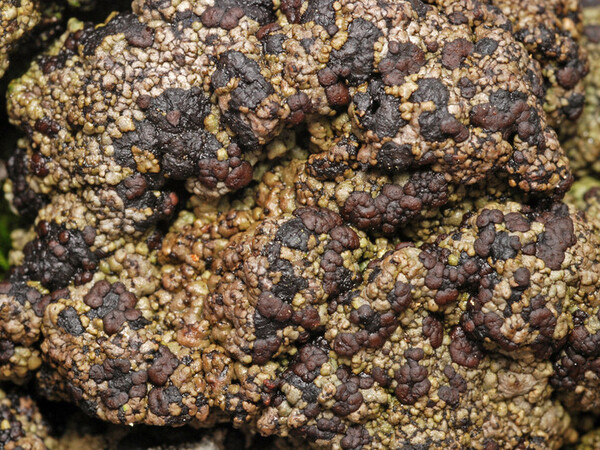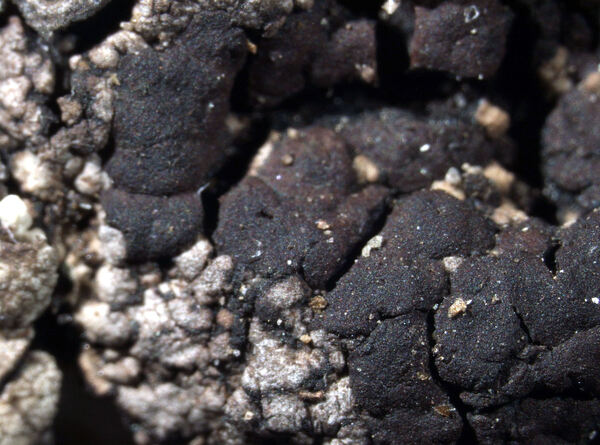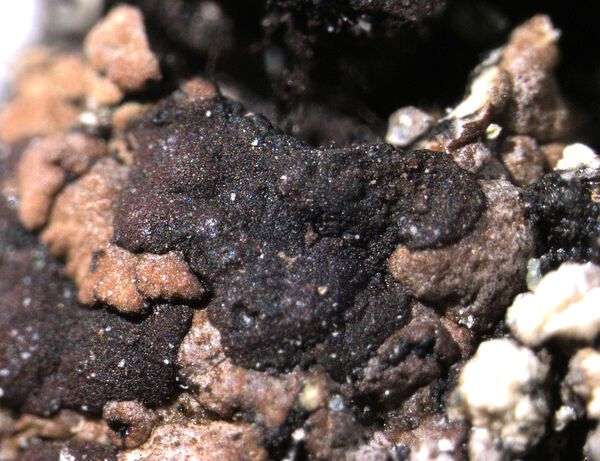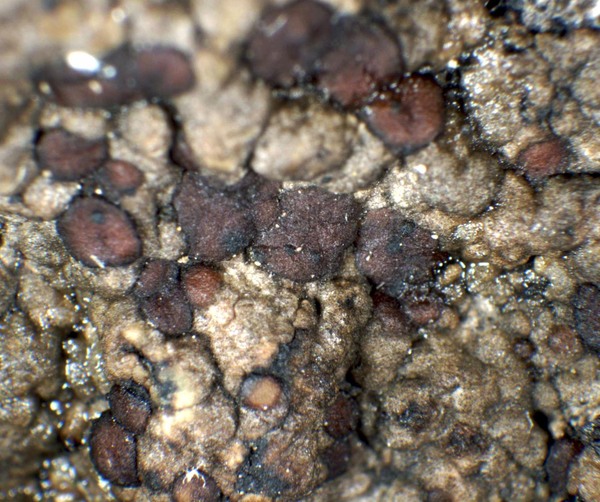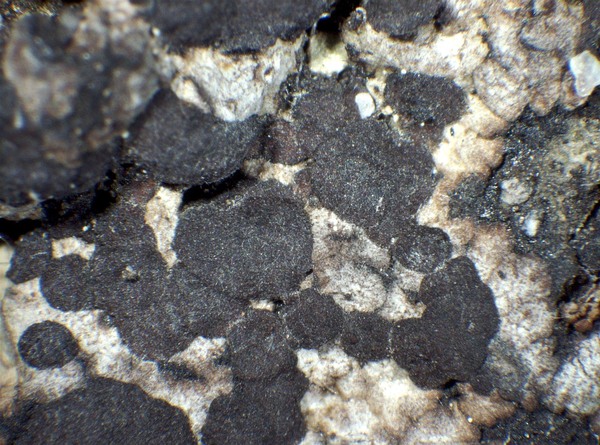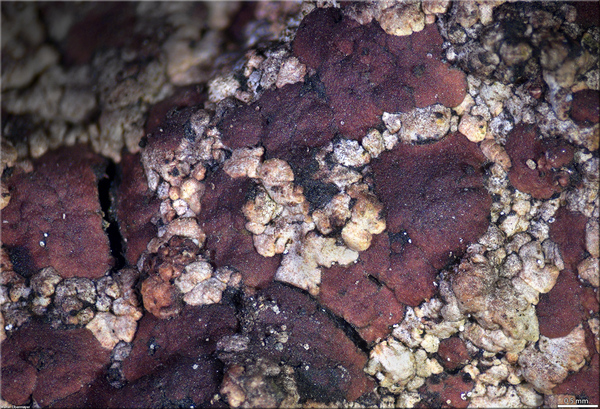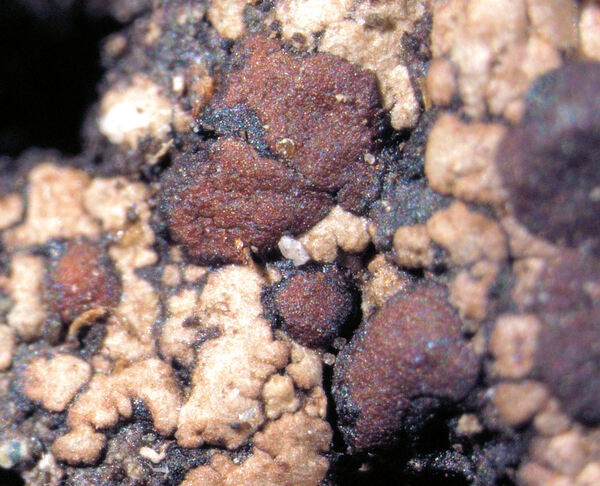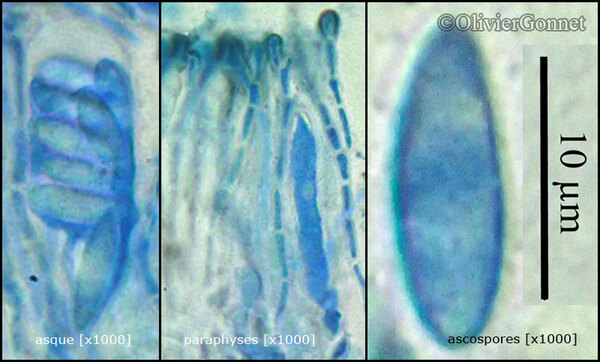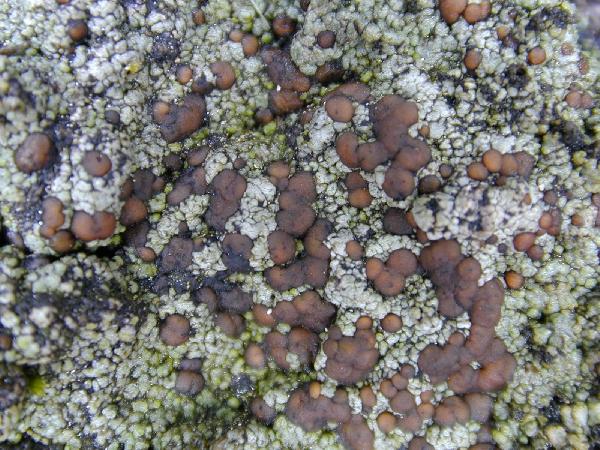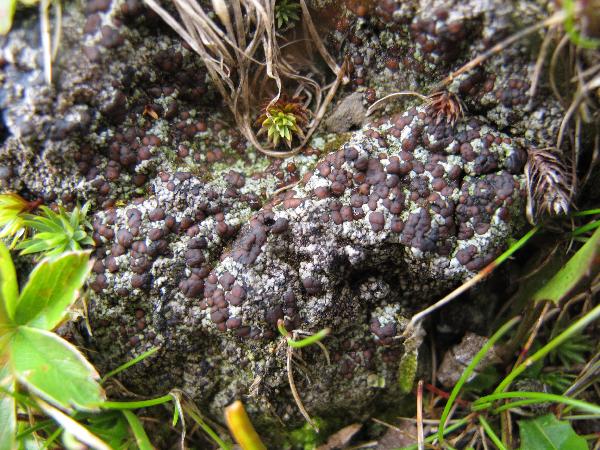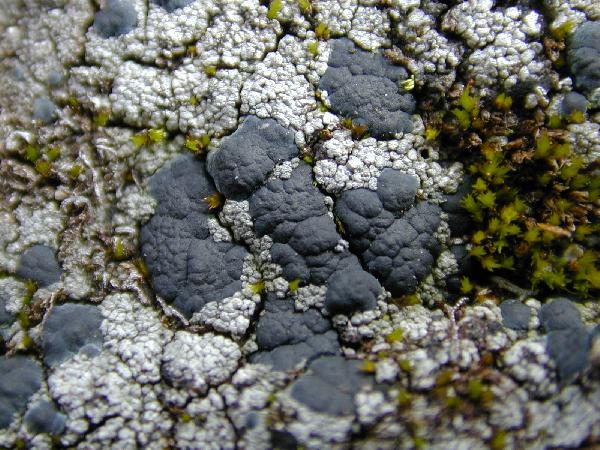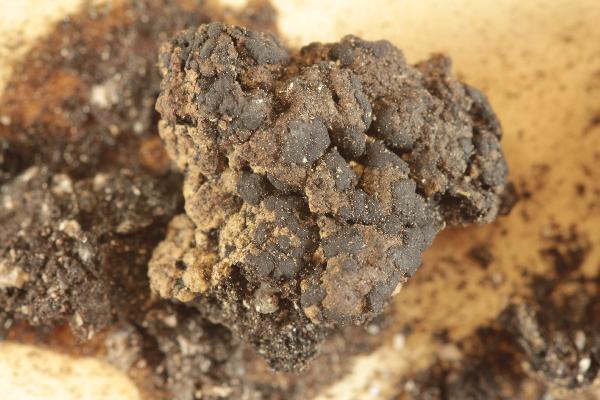Lecidoma demissum (Rutstr.) Gotth. Schneid. & Hertel
in Hertel, Herzogia, 5: 460, 1981. Basionym: Lichen demissus Rutstr. - Spicil. Pl. Crypt. Suec.: 8, 1794.
Synonyms: Biatora atrorufa (Dicks.) Fr.; Biatora demissa (Rutstr.) Fr.; Lecidea atrorufa (Dicks.) Ach.; Lecidea demissa (Rutstr.) Ach.; Lepidoma demissum (Rutstr.) M. Choisy; Psora atrorufa (Dicks.) Hook.; Psora demissa (Rutstr.) Stein
Distribution: N - Frl (Tretiach & Hafellner 2000), Ven, TAA (Lang 2009, Bilovitz & al. 2014, Nascimbene & al. 2022), Lomb (Dalle Vedove & al. 2004, Brackel 2013), Piem (Isocrono & al. 2004, Isocrono & Piervittori 2008), VA (Piervittori & Isocrono 1999, Piervittori & al. 2004). C - Tosc (Benesperi & al. 2007). S - Cal (Puntillo 1996).
Description: Thallus crustose-subsquamulose, dark brown to grey-brown in shade, thick, the areoles 1-2(-4) mm broad, flat to convex, contiguous or slightly imbricate, forming an up to 8(-12) cm wide, compact crust. Lower surface brown-black, tightly attached by black hyphae; cortex plectenchymatous; medulla white, I-. Apothecia biatorine, immersed to adnate, 0.5-3(-4) mm across, often coalescing, with a dull brown-black (red-brown when wet), flat to weakly convex disc, and a thin, very soon excluded proper margin. Proper exciple pale brown in outer part, colourless within, of radially arranged, thin-walled hyphae; epithecium reddish brown; hymenium colourless, 55-70 µm high, I+ blue; paraphyses coherent, mostly simple, 2-3 µm thick at mid-level, the apical cells slightly swollen, up to 4 µm wide, with a thin dark cap; hypothecium colourless. Asci clavate, thin-walled, with a I+ blue tholus and an internal, darker I+ tubular structure, the external gel I+ faintly blue, approaching the Porpidia-type. Ascospores 1-celled, hyaline, ellipsoid, (11-)12-16(-17) x 5-7 µm, thin-walled. Photobiont chlorococcoid. Spot tests: thallus K-, C-, KC-, P-, UV-. Chemistry: without lichen substances.Note: a circumpolar, arctic-alpine lichen found on soil, rarely on siliceous rocks, in clearings of Alpine grasslands with a long snow-lie; most common in the Alps, but also occurring in the mountains of Calabria.
Growth form: Crustose
Substrata: soil, terricolous mosses, and plant debris
Photobiont: green algae other than Trentepohlia
Reproductive strategy: mainly sexual
Commonnes-rarity: (info)
Alpine belt: common
Subalpine belt: very common
Oromediterranean belt: very rare
Montane belt: absent
Submediterranean belt: absent
Padanian area: absent
Humid submediterranean belt: absent
Humid mediterranean belt: absent
Dry mediterranean belt: absent
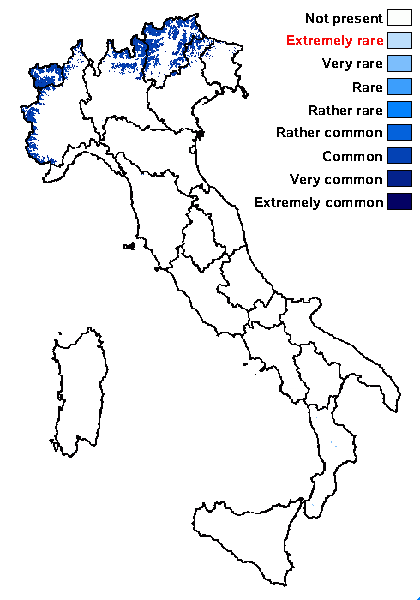
Predictive model
Herbarium samples
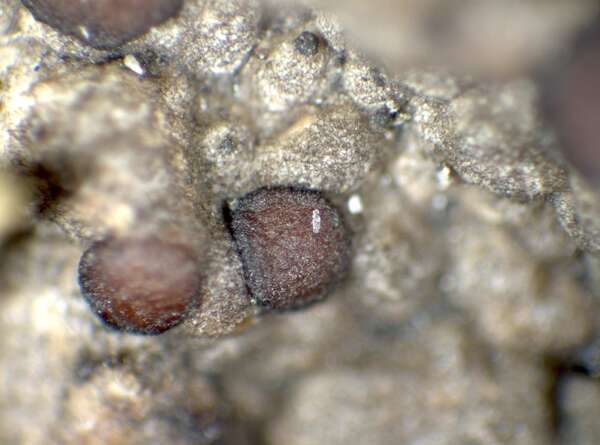

P.L. Nimis; Owner: Department of Life Sciences, University of Trieste
Herbarium: TSB (5275)
2001/11/26
detail of apothecium
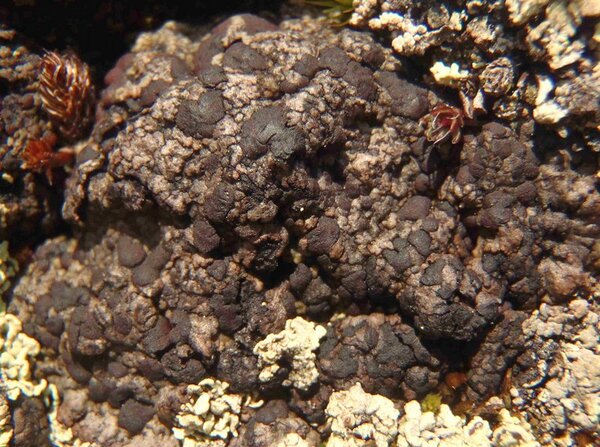

Curtis Randall Björk – CC BY-SA 4.0
British Columbia, Wells Gray Provincial Park, Trophy Mountains Date: 2011-08-07 On soil in alpine heath, siliceous
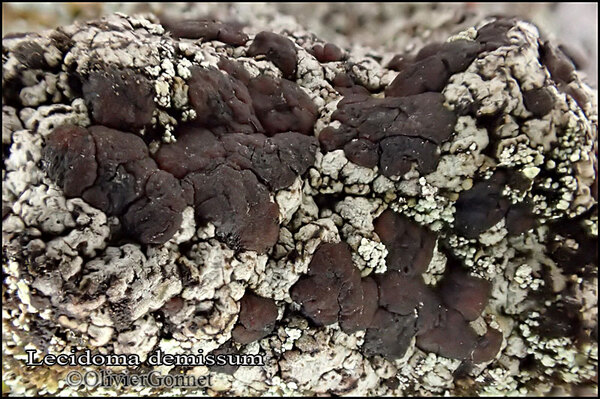
Courtesy Danièle et Olivier Gonnet - Source: https://www.afl-lichenologie.fr/Photos_AFL/Photos_AFL_L/Texte_L_3/Lecidoma_demissum.htm
France, Flaines, les grandes platières - Haute-Savoie
12/9/2015
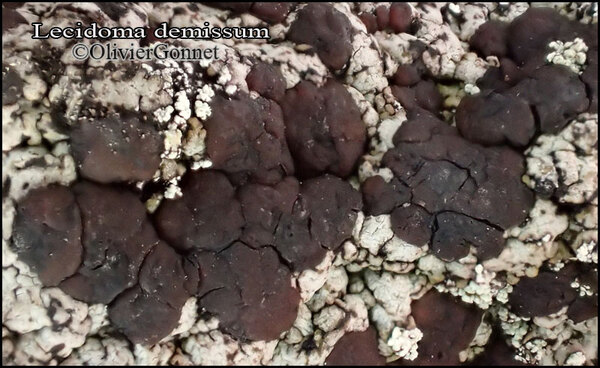
Courtesy Danièle et Olivier Gonnet - Source: https://www.afl-lichenologie.fr/Photos_AFL/Photos_AFL_L/Texte_L_3/Lecidoma_demissum.htm
France, Flaines, les grandes platières - Haute-Savoie
12/9/2015
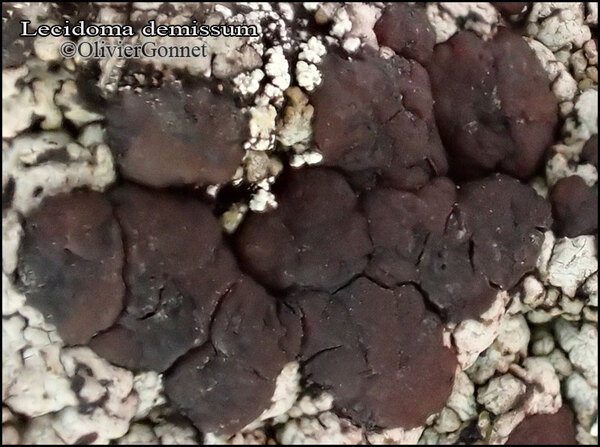
Courtesy Danièle et Olivier Gonnet - Source: https://www.afl-lichenologie.fr/Photos_AFL/Photos_AFL_L/Texte_L_3/Lecidoma_demissum.htm
France, Flaines, les grandes platières - Haute-Savoie
12/9/2015
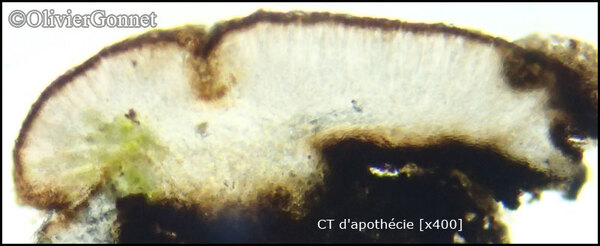
Courtesy Danièle et Olivier Gonnet - Source: https://www.afl-lichenologie.fr/Photos_AFL/Photos_AFL_L/Texte_L_3/Lecidoma_demissum.htm
France, Flaines, les grandes platières - Haute-Savoie
12/9/2015
Growth form: Crustose
Substrata: soil, terricolous mosses, and plant debris
Photobiont: green algae other than Trentepohlia
Reproductive strategy: mainly sexual
Commonnes-rarity: (info)
Alpine belt: common
Subalpine belt: very common
Oromediterranean belt: very rare
Montane belt: absent
Submediterranean belt: absent
Padanian area: absent
Humid submediterranean belt: absent
Humid mediterranean belt: absent
Dry mediterranean belt: absent

Predictive model
| Herbarium samples |


P.L. Nimis; Owner: Department of Life Sciences, University of Trieste
Herbarium: TSB (5275)
2001/11/26
detail of apothecium


Curtis Randall Björk – CC BY-SA 4.0
British Columbia, Wells Gray Provincial Park, Trophy Mountains Date: 2011-08-07 On soil in alpine heath, siliceous

Courtesy Danièle et Olivier Gonnet - Source: https://www.afl-lichenologie.fr/Photos_AFL/Photos_AFL_L/Texte_L_3/Lecidoma_demissum.htm
France, Flaines, les grandes platières - Haute-Savoie
12/9/2015

Courtesy Danièle et Olivier Gonnet - Source: https://www.afl-lichenologie.fr/Photos_AFL/Photos_AFL_L/Texte_L_3/Lecidoma_demissum.htm
France, Flaines, les grandes platières - Haute-Savoie
12/9/2015

Courtesy Danièle et Olivier Gonnet - Source: https://www.afl-lichenologie.fr/Photos_AFL/Photos_AFL_L/Texte_L_3/Lecidoma_demissum.htm
France, Flaines, les grandes platières - Haute-Savoie
12/9/2015

 INDEX FUNGORUM
INDEX FUNGORUM
 GBIF
GBIF
 DOLICHENS
DOLICHENS
